Filter by
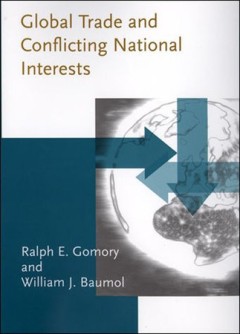
Global trade and conflicting national interests
Ralph Gomory and William Baumol adapt classical trade models to the modern world economy.In this book Ralph Gomory and William Baumol adapt classical trade models to the modern world economy. Trade today is dominated by manufactured goods, rapidly moving technology, and huge firms that benefit from economies of scale. This is very different from the largely agricultural world in which the class…
- Edition
- -
- ISBN/ISSN
- 9780262274050
- Collation
- 1 online resource (xvi, 199 pages) :illustrations.
- Series Title
- Lionel Robbins Lectures
- Call Number
- 380 GOM g
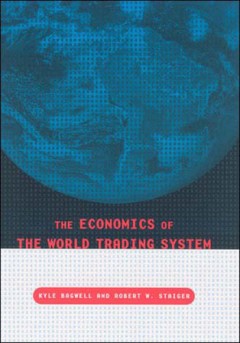
The economics of the world trading system
World trade is governed by the rules of the World Trade Organization (WTO), the successor to the General Agreement on Tariffs and Trade (GATT). The WTO sets rules of conduct for the international trade of goods and services and for intellectual property rights, provides a forum for multinational negotiations to resolve trade problems, and has a formal mechanism for dispute settlement. It is the…
- Edition
- -
- ISBN/ISSN
- 9780262267540
- Collation
- 1 online resource (xiii, 224 pages) :illustrations
- Series Title
- -
- Call Number
- -
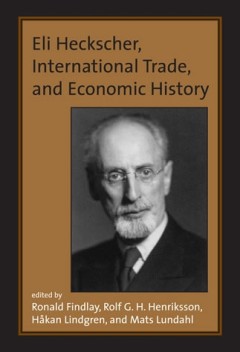
Eli Heckscher, International Trade, and Economic History
"The contributors first discuss Heckscher's efforts to forge the discipline of economic history by combining both the historian's careful evaluation of sources and the economist's rigorous models. The Heckscher-Ohlin theory of factor proportions is described and tested empirically. Contributors then apply the theory to historical material, including Mediterranean trade in Biblical times, the ec…
- Edition
- -
- ISBN/ISSN
- 9780262272643
- Collation
- 1 online resource (xi, 560 pages, 8 unnumbered pages of plates) :illustrations
- Series Title
- -
- Call Number
- -
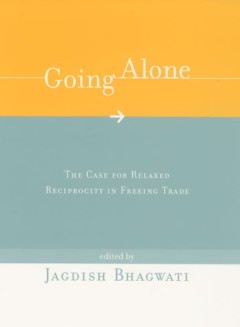
Going alone :the case for relaxed reciprocity in freeing trade
An analytic and empirical study of unilateral trade liberalization agreements, from the nineteenth century to the present.Since the end of World War II, the freeing of trade has been most visible in reciprocal liberalization agreements negotiated under the General Agreement on Tariffs and Trade, or GATT, and through increasing bilateral and plurilateral agreements. There has also, however, been…
- Edition
- -
- ISBN/ISSN
- 9780262268455
- Collation
- 1 online resource (xii, 586 pages) : illustrations
- Series Title
- -
- Call Number
- -
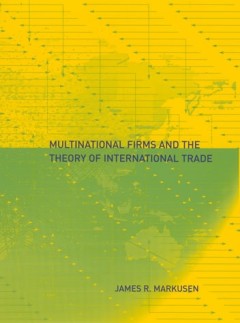
Multinational firms and the theory of international trade
Despite the great importance of multinational firms in international economics, theoretical and empirical research on these firms has generally been conducted separately from that on international trade. In this book, James Markusen provides a comprehensive integration of the two fields. Drawing on twenty years of research, he focuses on the interaction of scale economies, trade costs, factor e…
- Edition
- -
- ISBN/ISSN
- 9780262279154
- Collation
- 1 online resource (xxii, 440 pages) :illustrations
- Series Title
- -
- Call Number
- -
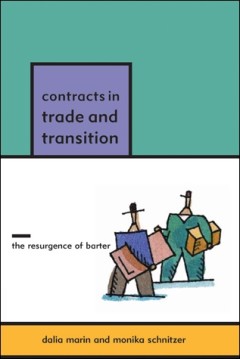
Contracts in Trade and Transition: The Resurgence of Barter
An institutional approach to explaining countertrade and barter in international trade and domestic trade in transition economies.Difficulties in contract enforcement impede international transactions in the world economy and domestic transactions in transition economies. In Contracts in Trade and Transition, Dalia Marin and Monika Schnitzer explain how barter as an economic institution can fac…
- Edition
- -
- ISBN/ISSN
- 9780262279123
- Collation
- 1 online resource (xvi, 206 pages) :illustrations
- Series Title
- -
- Call Number
- -
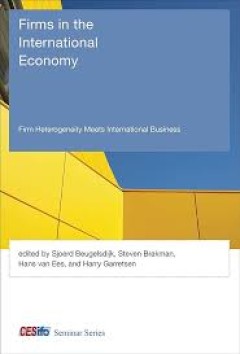
Firms in the International Economy :Firm Heterogeneity Meets International Bu…
International Economics (IE) and International Business (IB) are usually treated as two separate disciplines. With the advent of new trade theory the firm was reintroduced in IE and the fields more and more discuss the same topics. This book shows that IE as well as IB could benefit from each other.OCLC-licensed vendor bibliographic record.
- Edition
- -
- ISBN/ISSN
- 1306203643
- Collation
- 1 online resource.
- Series Title
- -
- Call Number
- -
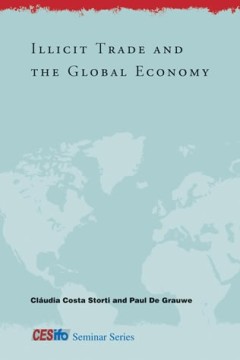
Illicit Trade and the Global Economy
Economists explore the relationship between expanding international trade and the parallel growth in illicit trade, including illegal drugs, smuggling, and organized crime.OCLC-licensed vendor bibliographic record.
- Edition
- -
- ISBN/ISSN
- 0262298686
- Collation
- 1 online resource (x, 266 pages) :illustrations.
- Series Title
- -
- Call Number
- -

Rethinking international trade
Over the past decade, a small group of economists has challenged traditional wisdom about international trade. Rethinking International Trade provides a coherent account of this research program and traces the key steps in an exciting new trade theory that offers, among other possibilities, new arguments against free trade. Over the past decade a small group of economists has challenged traditi…
- Edition
- -
- ISBN/ISSN
- 0585343926
- Collation
- 1 online resource (viii, 282 pages) :illustrations
- Series Title
- -
- Call Number
- -

The spatial economy :cities, regions, and international trade
Originally published: 1999.The authors show how a common approach that emphasizes the three-way interaction among increasing returns, transportation costs, and the movement of productive factors can be applied to a wide range of issues in urban, regional, and international economics.Since 1990 there has been a renaissance of theoretical and empirical work on the spatial aspects of the economy--…
- Edition
- -
- ISBN/ISSN
- 9780262273329
- Collation
- 1 online resource (xiii, 367 pages) :illustrations
- Series Title
- -
- Call Number
- -
 Computer Science, Information & General Works
Computer Science, Information & General Works  Philosophy & Psychology
Philosophy & Psychology  Religion
Religion  Social Sciences
Social Sciences  Language
Language  Pure Science
Pure Science  Applied Sciences
Applied Sciences  Art & Recreation
Art & Recreation  Literature
Literature  History & Geography
History & Geography